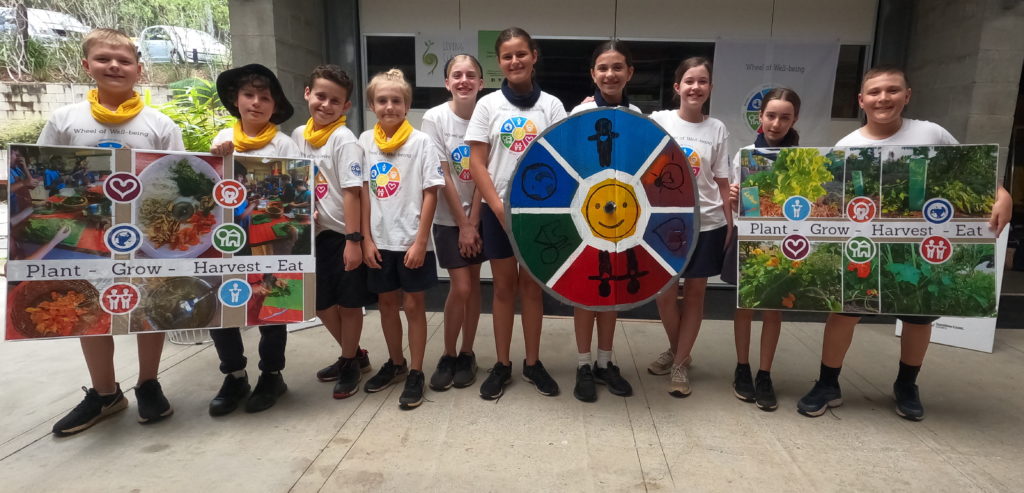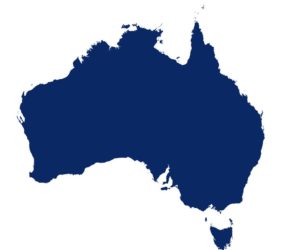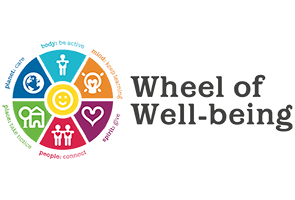
Case Study: WoW in Queensland Australia
Implementing the Wheel of Wellbeing in Queensland
What is the Wheel of Wellbeing (WoW)?
- In 2008, the UK Government’s Foresight report highlighted 5 themes which they evidenced as promoting wellbeing and buffers against mental illness (Aked et al., 2008).
- In 2009, the South London and Maudsley NHS Foundation Trust utilised these themes to create the Wheel of Wellbeing. They later included a final theme, looking after the environment.
Body: Be Active
Mind: Keep Learning
Spirit: Give
People: Connect
Place: Take Notice
Planet: care
Evidence base
- There have been a number of evaluations demonstrating the efficacy of the WoW framework and approach. This includes the WoW “theory of change” and the “WoW ripple effect”.
- Another example of this can be seen in a 2011 evaluation conducted by the University of East London, this can be accessed through the following link.
- Linda Dow recently produced a thesis paper on the applications of the WoW for people experiencing severe mental illness.
The thesis has not yet been published however details of the research and its findings can be accessed through the following link.
The WoW in practice
- Since its inception, the WoW has been used across a variety of contexts.
- It can be delivered through a number of methods including workshops and activities.
- These are targeted at informing and supporting people to take steps to improve their wellbeing and mental health.
Queensland projects
- In Australia, the WoW was adopted by the Queensland Mental Health Commission (QMHC) for their Wellbeing Capacity Building Projects, which were designed and delivered by Implemental.
- The WoW program was delivered in three key sectors: a state primary school, a government service branch and in the Regional Mental Health and Wellbeing hubs
State Primary School
Purpose
- Implemental collaborated with the Department of Education (DoE) to create a version of the WoW program which was tailored to educational settings.
- This program was created in alignment with both the original evidence base and the Department of Education policies and strategies.
- The focus of this project was in a primary school setting.
Project Delivery
- Implemental trained three members of staff from the DoE as WoW trainers.
- This training allowed the teachers who were verified WoW practitioners to implement WoW thinking into the existing school curriculum, policies and activities.
Outcomes
- Using the skills acquired in training, teachers were able to develop a range of activities to support their colleagues, their students and their parents.
- Examples of activities include: routine mindfulness activities for students to refocus after breaks, opportunities for staff to learn more about the WoW framework through staff meetings, newsletters, wellness days and WoW activities.
State school staff feedback
“There have been big increases in staff awareness of their own mental health.”
Anonymous testimonies (Rogers et al., 2021)
“During Covid, teachers ran meditation each morning. They said it really helped students start their day better.”
Anonymous testimonies (Rogers et al., 2021)
“Changes in health and wellbeing awareness and engagement, and practice, were evident in the education sector. There were clearly evidenced changes at organisational, and networks and systems levels.”
Lirata review (Rogers et al., 2021)
Government Services
Purpose
- Implemental delivered a number of WoW programs which were tailored to a regional branch of government service.
- The service leader was looking for ways to improve staff morale in a fast-paced work environment where staff were frequently exposed to high levels of stress and anxiety.
- The project was designed to provide a common language and framework for mental health and wellbeing, with the aim of facilitating engagement across various services and community stakeholders.
Project Delivery
- Implemental delivered a one-day introductory WoW workshop to 20 of the government organisation’s staff.
- Implemental’s advanced practitioners trained a number of the government service’s staff to become WoW practitioners using the five-day DIY Happiness workshops.
- The organisation’s leadership then collaborated with Implemental to support the development of tailored interactive WoW training and activities.
Outcomes
- The service has created a WoW community to support the health and wellbeing of their staff outside of the workplace.
- The service has integrated WoW thinking and practice into their induction program.
- Whilst attendance to these trainings and workshops were voluntary, the organisation has noted that all 200 members of staff have participated in WoW activities since the introduction course.
- They have Developed and delivered two structured WoW programs. These were a 14-week ‘WoW Explorer’ program and a 7-session ‘WoW lite’ program.
Government Service staff testimonies
“Staff are less stressed and more friendly since we started implementing the WoW.”
Anonymous testimonies (Rogers et al., 2021)
“You can visibly see changes in people. There’s more camaraderie, people are more familiar and friendly.”
Anonymous testimonies (Rogers et al., 2021)
“[Completing WoW training] gave me a renewed sense of purpose, personally and at work.”
Anonymous testimonies (Rogers et al., 2021)
Regional Mental Health and Wellbeing hubs
Purpose
- Implemental has collaborated with the Wellbeing Capacity Building project to introduce Regional Mental Health and Wellbeing hubs to WoW.
- The collaborators used the WoW to engage and support vulnerable and isolated members of the community.
- It was designed to provide a common language and framework for mental health and wellbeing.
Project Delivery
Implemental trained a Wellbeing Hub Coordinators to improve mental health in wellbeing across two communities. Two models were used:
- The WoW framework, to improve community wellbeing through training, activities and events.
- The Mental Wellbeing Impact Assessment, to guide decision making using health determinants, population characteristics and community values.
Outcomes
Using WoW branding, the coordinator collaborated with a variety of sources to facilitate:
- Six workshops which led to the development of the Collaborative Action Plan which focused on social areas such as housing, education and employment.
- Collaboration between key community and service leaders to deliver a Mental Wellbeing Impact Assessment.
- A community-led response to improve wellbeing through free activities and wellbeing days.
- Initiate a community-led response to wellbeing by initiating free activities for all age groups, wellbeing days, free transport and a network to improve access to health and social service.
- New and improved action plans for the operations of volunteer organisations.
- The training of two community members to become verified WoW practitioners and lead future training sessions.
Wellbeing and mental health hub testimonies
“When we started, the perception around mental health was that it was all about when things were not going well. There have been dramatic changes to perceptions… focusing more on health promotion and prevention activities.”
Anonymous testimonies (Rogers et al., 2021)
“This communities COVID-19 disaster management working group was better prepared to offer community driven solutions to the ‘shock’ of the crisis, compared to other local areas. The legacy of the WoW program was evident in the initiatives that emerged to support community resilience and recovery.”
Anonymous testimonies (Rogers et al., 2021)
WoW Evaluations
The “Ripple Effect”
- Spain et al. (2021) have investigated the “Ripple Effect” of the WoW using Ripple Effects Mapping methods.
- They found that the WoW programs not only influenced participants to take charge of their own wellbeing, but that the WoW community platforms were effective for sharing resources, connections, and ideas.
The paper is freely accessible by clicking the following link.
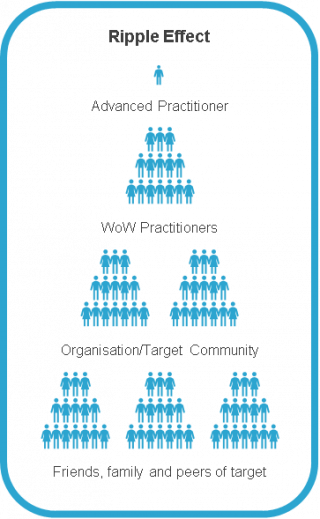
Theory of Change
- In 2016, the McPin Foundation were commissioned to create a Theory of Change model.
- The model was created to articulate clear aims and actions for change which were to be set out and implemented by the WoW.
- The foundation also developed data collection tools and produced evaluation guidance which can be accessed through the following link.
Theory of Change Evaluation Report
An evaluation of the WoW in Queensland conducted by Rogers et al. (2021) reported the lasting and powerful impacts of the programmes. A summary of these be seen in the following infographics.
They reported that:
“The WoW framework is being effectively shared both within and across organisations, systems and communities, in some cases disseminating new health and wellbeing thinking and practice to isolated and vulnerable communities”.
Further representation of their findings can be seen below:
90%
55%
Of Advanced Practitioners adapted the course for their sector.
Of WoW practitioners stated that WoW had been embedded, at least in part, in their organisations.
750
2,250
750
WoW workshops were run which represented an average of 2.5 per practitioner.
WoW activities were run which represented an average of 7.5 per practitioner.
Rogers et al. (2021)
A note from the team
Implemental would like to thank Simone Caynes from the Queensland Mental Health Commission for her support and cooperation in championing the delivery of the WoW programme across Queensland.
Implemental would also like to thank the Mental Health Commission team for their work cooperating with stakeholders and ensuring projects were run successfully.
Implemental looks forward to collaborating with the Queensland Mental Health commission in future projects.
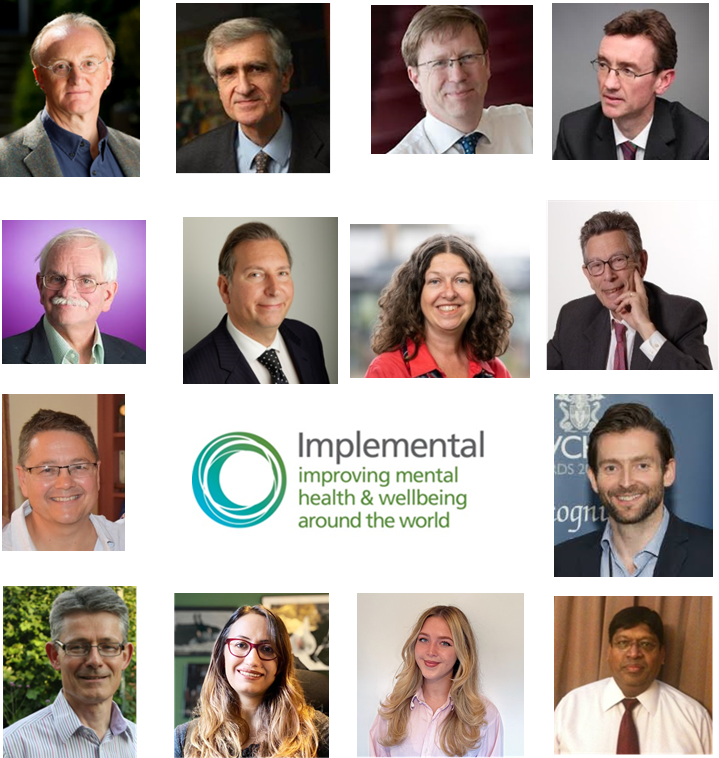
References
- Aked, J., Marks, N., Cordon, C., & Thompson, S. (2008). Five ways to wellbeing: Communicating the evidence.
- Rogers, N., K. Rosauer & K. Randall. 2021. Review of the Queensland Mental Health Commission Wellbeing Capacity Building Project. Final Report. Melbourne: Lirata Consulting.
- Spain, D., Stewart, V., Betts, H., & Wheeler, A. J. (2021). Wheel of Wellbeing (WoW) health promotion program: Australian participants report on their experiences and impacts. BMC Public Health, 21(1), 1–11. https://doi.org/10.1186/s12889-021-12076-x]
I'M FREE!
To register to our newsletter
Leave your email and receive news and useful wellbeing tips!
